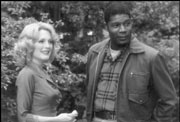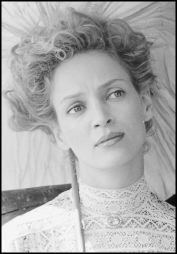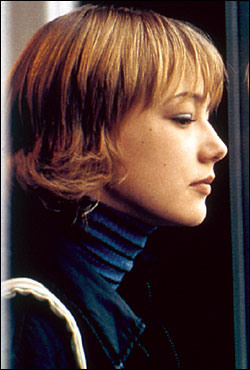FAR FROM HEAVEN
written and directed by Todd Haynes
opens Nov. 15 at Pacific Place and Seven Gables
Far From Heaven is the most luscious smart movie around; the kicker is how moving it is behind all its gorgeousness. Todd Haynes has made his most deeply felt film in the bersaturated style of Douglas Sirk’s great ’50s melodramas (Imitation of Life, All That Heaven Allows), where autumn leaves and crinolined actresses blazed, swirled, and fell, almost as one. You don’t have to know, or even care, about the lionized Sirk to absorb the full impact of Heaven. A moment comes when you surrender to it utterly—for me, it was the wind carrying a lilac chiffon scarf between two forbidden lovers—and see that it more than stands on its own, not as camp or kitsch, but as one master appropriating the seductive surfaces of another to make his own bold statement.
Haynes sets his domestic tragedy in Hartford, Conn., smug and insular in the deceptively controlled calm of the Eisenhower era. Here, in 1957, where alcohol is the drug of choice, ladies might lunch, but father knows best; wives know their place; and children, barely seen or heard, are generally left to the “colored” maid, who absolutely knows her place.
Outside, far outside, it’s the depths of the Cold War. At home, civil rights are a roiling issue, but inside this lily-white snow dome there are no overt enemies—no foreclosing bankers, no blacks demanding a seat on the bus—to unsettle a family as solid and accomplished as TV sales exec Frank (Dennis Quaid) and Cathy Whitaker (Julianne Moore), his homemaker par excellence. They’re even dubbed “Mr. and Mrs. Magnatec” by admiring neighbors in their insular company town.
MELODRAMA DOESN’T need enemies; its characters’ hidden, uncontrollable desires are danger enough, and society, with its implacable rules, stands ready to punish rebels. (Here, “society” is the spiky Patricia Clarkson, Moore’s prying best friend, an icy reminder of the dangers of surface friendships, in the ’50s—or any time.)
Buoyed by Elmer Bernstein’s sumptuous score (with its faint echo of A Place in the Sun), Haynes plunges us straight into the action after one good, long, irony-free look around the sprawling Whitaker homestead: at blond bouffant Cathy, radiating self-assurance; her two satellite children (“I want to look just like my lovely mother,” her daughter breathes, watching her dress for a party); and their “treasure” of a maid (Viola Davis).
If our impulse is to giggle and to feel distanced, it’s stifled soon enough, as the film’s dark underside seeps through. Instead of going to that party, Cathy has to collect an angry, defensive, humiliated Frank from the police station—not for the era’s harmless DUI but for “loitering,” a charge she barely comprehends. It’s the first crack in the snow dome, which will be in shards before half the film is over.
HEAVEN LIVES OR DIES by its cast, and Moore, Haynes’ muse ever since Safe, is at some nearly magical pitch: controlled yet incendiary. It’s as though she’d studied the queens of Sirk’s wild, weepie era—the Styrofoam resilience of Lana Turner, Jane Wyman’s stoic sufferer, and Dorothy Malone, the most delirious masochist of them all—and decided to shoot the moon. With the help of Haynes’ fellow artists (particularly Ed Lachman’s cinematography and the wit of Sandy Powell’s costumes), Moore eclipses them all.
Sturdily beside her are Quaid, unexpectedly touching as the perfect gray-flannel-suited husband who’s blindsided by his growing recognition of his homosexuality, and Dennis Haysbert as Raymond, the Whitaker’s black landscaper, a man so accomplished that in the ’50s, he’d have been played by Sidney Poitier, or, in Sirk-land, Rock Hudson. Haysbert gives Raymond such empathy and quiet magnetism that his innocent hand of friendship puts Cathy in danger from buzzing racist gossips. (It’s not the first time that Haysbert’s dignity has made him a noble untouchable; he had this same assurance and charisma with Michelle Pfeiffer in Love Field. TV simply makes him president on 24. Where do we go to vote?)
For all the film’s technical bravura, including Mark Friedberg’s flawless production design, it’s these three actors, under Haynes’ precise direction, who make their characters immediate, touching, and powerful (something distinctly un-Sirk-like). Haynes, the great theorist, seems to have been pushed into even deeper empathy for these characters and their eventual existential solitude. Or maybe it’s reuniting with Moore—if so, neither of them should ever work with anyone else.









